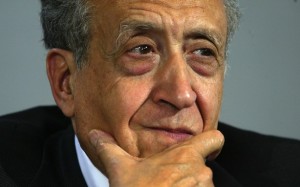 The new UN-Arab League envoy on Syria, Lakhdar Brahimi, has given a deeply pessimistic view of the task ahead of him, as he takes up his new post.
The new UN-Arab League envoy on Syria, Lakhdar Brahimi, has given a deeply pessimistic view of the task ahead of him, as he takes up his new post.
Speaking to the BBC, the Algerian described his mission as “nearly impossible”.
Mr Brahimi, a seasoned UN diplomat, was appointed after his predecessor, Kofi Annan, resigned, saying he no longer saw a way to fulfil his mission.
Fighting in Syria has escalated, despite a truce mediated by Mr Annan.
Activists say 20,000 people have died since the uprising against the Syrian government began last March.
On Sunday, the pro-rebel Syrian Observatory for Human Rights said more than 5,000 people were killed in August alone.
The conflict has increasingly come to resemble a full-scale civil war, forcing an estimated one million Syrians from their homes.
Last month, the United Nations wound up the observer mission that had been tasked with monitoring the cease-fire in Syria under the six-point peace plan negotiated by Mr Annan.
“I’m coming into this job with my eyes open, and no illusions,” Mr Brahimi told the BBC’s Lyse Doucet in an interview in New York.
“I know how difficult it is – how nearly impossible. I can’t say impossible – [it is] nearly impossible.
“I know how difficult it is – how nearly impossible. I can’t say impossible – [it is] nearly impossible.
Our correspondent says that, with few people believing that Mr Brahimi can do much, it seems he sees his job as keeping expectations low.
Burden
A former Algerian foreign minister, Mr Brahimi has also held a series of key UN appointments, including that of UN envoy to Afghanistan and mediator of the peace deal that ended the Lebanese civil war.
Analysts say he has a formidable reputation at the UN and his appointment was widely welcomed.
But Mr Brahimi admitted some trepidation about his new mission, saying he could understand those frustrated with the lack of international action in Syria.
“I’m scared of the weight of responsibility. People are already saying people are dying and what are you doing?
“And we are not doing much. That in itself is a terrible weight.”
Mr Brahimi said he had so far failed to see “any cracks” in the “brick wall” that had defeated Mr Annan – an “intransigent” Syrian government, escalating rebel violence and a paralysed UN Security Council, where China and Russia have vetoed several resolutions aimed at putting pressure on Damascus.
He said he would keep Mr Annan’s six-point peace plan – now seen by many as irrelevant – in his “tool box” for possible adaptation, but admitted he “had ideas, but no plan yet”, apart from talking to as many people as possible.
Addressing the Syrian government, he said the need for political change in Syria was “fundamental and urgent”, but – as he has previously – refused to be drawn on whether President Assad should step down, as the opposition and several Western leaders are demanding.
“Change cannot be cosmetic,” he said. “There will be a new order but I do not know who will be the people in the order. That’s for Syrians to decide.”
“Change cannot be cosmetic,” he said. “There will be a new order but I do not know who will be the people in the order. That’s for Syrians to decide.”
He also sought to keep a distance between himself and the rebels, who have criticised him for his cautious stance.
“Please remember I am not joining your movement,” he said. “I am working for two international organisations, the United Nations and the Arab League, and I do not speak the same language as you.”
New fighting
Mr Brahimi’s comments to the BBC came after another day of violence inside Syria on Sunday.
In the capital Damascus, an explosion hit a district where major military and security compounds are located, reports say.
State TV described the blast – involving two bombs – as “terrorism” and said four people had been lightly injured.
Rebels and government forces have been involved in a fierce battle for Damascus since July.
The building affected was a base for officers guarding the joint chiefs of staff offices nearby but was empty at the time, officials said.
Bomb attacks in Damascus and the largest city Aleppo have become increasingly frequent in recent months, with the authorities often blaming them on “armed terrorist gangs”.
BBC
Analysis by
Lyse Doucet
Chief International Correspondent, BBC News
Lakhdar Brahimi has embarked on one of the world’s toughest jobs.
But as one of the UN’s most experienced troubleshooters, he may offer the skills needed in a conflict where both sides seem to believe they have no choice but to fight to the end.
Mr Brahimi often deployed a “no victor, no vanquished” power-sharing approach in previous mediations, including the 1989 agreement that ended Lebanon’s 15-year civil war.
UN sources who have worked closely with Mr Brahimi over many years say he will be more involved in the minutiae of the process, engaging personally with all the key players, and drawing on his own extensive experience and contacts in the region and beyond, not to mention his understanding of Arab politics and language.
He plans to base his office in Damascus if possible, or in Cairo, and to spend as much time as possible in the region.
But for the time being, there is little optimism anywhere that much can be done. Even Mr Brahimi sees his job as keeping expectations low.
BBC

Leave a Reply
You must be logged in to post a comment.